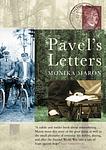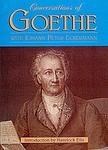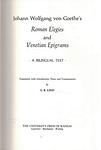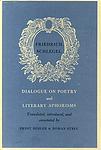The Greatest German "Literary Letters" Books of All Time
Click to learn how this list is calculated.
This list represents a comprehensive and trusted collection of the greatest books. Developed through a specialized algorithm, it brings together 300 'best of' book lists to form a definitive guide to the world's most acclaimed books. For those interested in how these books are chosen, additional details can be found on the rankings page.
Genres
Literary Letters is a genre of books that consists of collections of letters written by authors, poets, and other literary figures. These letters offer a unique insight into the lives and thoughts of these individuals, as well as the historical and cultural context in which they lived. Literary Letters can include personal correspondence, professional communication, and even fictional letters written by characters in novels. This genre provides readers with a fascinating glimpse into the minds of some of the most influential writers in history.
Countries
Date Range
Reading Statistics
Click the button below to see how many of these books you've read!
Download
If you're interested in downloading this list as a CSV file for use in a spreadsheet application, you can easily do so by clicking the button below. Please note that to ensure a manageable file size and faster download, the CSV will include details for only the first 500 books.
Download-
1. Beethoven's Letters by Ludwig van Beethoven
This book offers an intimate glimpse into the personal life and inner world of one of classical music's greatest composers through a collection of his correspondence. Spanning from his early years in Bonn through his rise to fame in Vienna and until his death, the letters reveal his relationships with family, friends, and fellow artists, his struggles with hearing loss, and his insights into his creative process. They also reflect his financial worries, his search for love, and his passionate involvement with the political and cultural movements of his time. The letters are a testament to his enduring legacy and provide a deeper understanding of his music through the lens of his personal experiences and emotions.
-
2. Sudelbücher by Georg Christoph Lichtenberg
"Sudelbücher" is a collection of thoughts, observations, and philosophical reflections by a prominent German satirist. The book is a compilation of his personal notebooks, where he jotted down everything from scientific observations to social commentary and personal introspection. The author's unique perspective and witty voice provide a fascinating glimpse into the mind of an 18th-century scholar, making this book an important piece of German literature and Enlightenment thought.
-
3. Pavel's Letters by Monika Maron
"Pavel's Letters" is a poignant narrative that explores the personal journey of a novelist who uncovers her family's past in war-torn Poland. After receiving a collection of letters from her grandfather, Pavel, the protagonist delves into the history of her family, their experiences during World War II, and the hardships they faced under Stalin's regime. The book is a compelling blend of personal memories, historical facts, and the exploration of the human spirit's resilience in the face of adversity.
-
4. Conversations Of Goethe With Johann Peter Eckermann by Johann Wolfgang von Goethe, Johann Peter Eckermann
This book is a compilation of detailed discussions between one of Germany's greatest literary figures and his close friend and secretary, spanning from 1823 to 1832. It offers an intimate glimpse into the mind, thoughts, and philosophies of the celebrated writer, covering a wide array of subjects including literature, art, science, and the nature of human existence. Through these conversations, readers are provided with profound insights into the intellectual landscape of early 19th-century Europe and the personal reflections of a man who shaped modern German literature. The dialogues are not only significant for their historical context but also for their enduring relevance to contemporary discussions on culture and creativity.
-
5. Venetian Epigrams by Johann Wolfgang von Goethe
"Venetian Epigrams" is a collection of short, incisive poems that reflect the author's observations and experiences during a stay in Venice. Written with a blend of wit, irony, and lyrical beauty, the epigrams delve into themes such as love, sexuality, art, and the nature of society. The author's sharp commentary on the Venetian way of life, as well as his personal reflections on human relationships and the pursuit of pleasure, are presented in a concise and often provocative manner, revealing the depth of his engagement with the culture and the vibrancy of the city that inspired him.
-
6. Dialogue On Poetry And Literary Aphorisms by Friedrich Schlegel
This book is a collection of philosophical reflections on the nature of poetry and the essence of literary creation. Through a series of aphorisms and dialogues, the work explores the concept of Romantic poetry as the ultimate form of art, emphasizing the importance of creativity, the interplay between the universal and the individual, and the role of the poet as both creator and critic. The text delves into the idea that poetry should strive for an infinite progression, always seeking to transcend the limitations of form and content, and posits that through this ongoing quest for the new and the unknown, literature can achieve a sublime expression of human thought and emotion.
Reading Statistics
Click the button below to see how many of these books you've read!
Download
If you're interested in downloading this list as a CSV file for use in a spreadsheet application, you can easily do so by clicking the button below. Please note that to ensure a manageable file size and faster download, the CSV will include details for only the first 500 books.
Download




